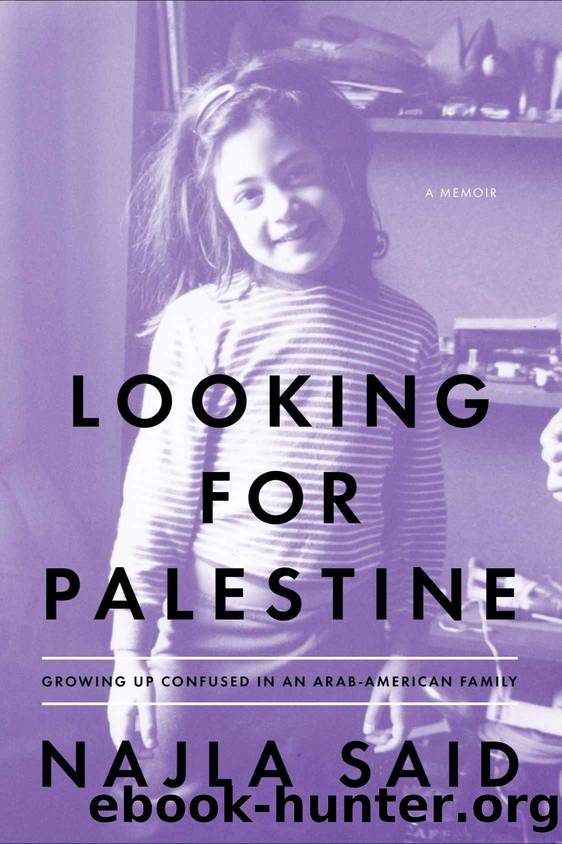Looking for Palestine: Growing Up Confused in an Arab-American Family by Najla Said

Author:Najla Said [Said, Najla]
Language: eng
Format: epub
Publisher: Penguin Group US
Published: 2013-08-01T05:00:00+00:00
I SET OUT TO FIND a way to exploit the âgoodâ things about being Arab, to make myself at least seem as if I were beautiful, mysterious, and exotic, even if I privately knew otherwise. If eighth and ninth grades had been my horrible, ugly, awkward, and chubby years, I was determined for the remaining years of high school to fashion myself into the âbeautyâ that friends like Jenny insisted I was.
By this point, in the early â90s, my dad had become quite famous. It was impossible not to notice the way people acted around him and how they reacted to the fact that he was my father. Or was it that I now had a greater appreciation for his accomplishments? I no longer felt the embarrassment in my elegant, cosmopolitan parents that I had felt when I was younger. But that doesnât mean I was actually comfortable with my own Arab-ness.
There were still those moments like these in my life: The bus pass lady at school once said to me loudly, âYour father is Gaddafi, right???â I felt the long line of students behind me lean forward with curiosity, grabbed the pass from her, mumbled something corrective and apologetic, and walked away.
I was still a non-Zionist in a sea of Zionists. When Jenny asked me if it bothered me that her parents were Zionists, I said no, because it didnât. Then I went home and asked my parents what that actually meant. They explained that Zionism was a political movement that was exclusionary, inasmuch as it asserted that Israel retain its Jewish character, within at least parts of historic Palestine. I knew Jenny and her parents had been to Israel a handful of times and considered it a place for Jews, but that hadnât surprised me, or made me uncomfortable, because I also knew, very clearly, that her parents adored me, and had no cultural or racist misconceptions about Palestinians. In fact, they knew more about what was going on in Palestine than any other Jewish people I had ever met.
I knew that my parents were against violence in all its forms, and I knew that it wasnât fair that my dad was born in a place called Palestine that ultimately became a place called Israel. I didnât know it then but I believed in social justice and had been steeped in secular, humanistic thought since birth. I believed in the cause of a people that others quickly labeled âterrorists.â This âcauseâ that I was attached to was definitely not something I thought of as in any way noble or just, though. In my adolescent consciousness, it was an embarrassing nuisance that made me different from my friends. I wished it werenât something I had to think about. I continued to wish that I were just âa quarter Irish, a quarter Scottish, a quarter German, and a quarter Swedishâ like all my friends seemed to be.
When I entered high school, in the fall of 1988, the Palestinian intifada, which had begun a year earlier, was well under way.
Download
This site does not store any files on its server. We only index and link to content provided by other sites. Please contact the content providers to delete copyright contents if any and email us, we'll remove relevant links or contents immediately.
Down the Drain by Julia Fox(981)
The Light We Carry by Michelle Obama(899)
Cher by Cher(798)
Simple Passion by Annie Ernaux(747)
Love, Pamela by Pamela Anderson(603)
The Nazis Knew My Name by Magda Hellinger & Maya Lee(579)
Zen Under Fire by Marianne Elliott(564)
You're That Bitch by Bretman Rock(551)
Novelist as a Vocation by Haruki Murakami(543)
Alone Together: Sailing Solo to Hawaii and Beyond by Christian Williams(532)
The Foxfire Book of Appalachian Women by Kami Ahrens(531)
Kamala Harris by Chidanand Rajghatta(496)
Gambling Man by Lionel Barber(488)
The Barn by Wright Thompson(440)
Drinking Games by Sarah Levy(429)
A Renaissance of Our Own by Rachel E. Cargle(418)
Limitless by Mallory Weggemann(417)
A new method to evaluate the dose-effect relationship of a TCM formula Gegen Qinlian Decoction: âFocusâ mode of integrated biomarkers by unknow(416)
Memoirs of an Indian Woman by Shudha Mazumdar Geraldine Hancock Forbes(415)
